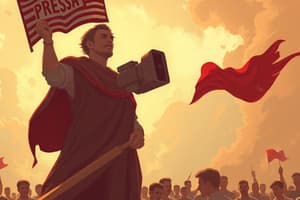Podcast
Questions and Answers
Journalists have the right to access all information sources relevant to their reporting.
Journalists have the right to access all information sources relevant to their reporting.
True (A)
The First Amendment in the United States does not protect journalists in public parks.
The First Amendment in the United States does not protect journalists in public parks.
False (B)
Journalists can be granted immunity from prosecution for reporting on acts of genocide.
Journalists can be granted immunity from prosecution for reporting on acts of genocide.
False (B)
Safety and security measures for journalists primarily involve legal protections from governmental censorship.
Safety and security measures for journalists primarily involve legal protections from governmental censorship.
Press freedom challenges often stem from restrictions imposed by various governments worldwide.
Press freedom challenges often stem from restrictions imposed by various governments worldwide.
Journalists have the right to express their opinions without any restrictions.
Journalists have the right to express their opinions without any restrictions.
The protection of a journalist's information source is only applicable to non-confidential sources.
The protection of a journalist's information source is only applicable to non-confidential sources.
Journalists can freely cover public events even if they are critical of governmental actions.
Journalists can freely cover public events even if they are critical of governmental actions.
Journalists in conflict zones do not have the right to protect their personal safety.
Journalists in conflict zones do not have the right to protect their personal safety.
Editorial autonomy for journalists means they should be loyal to the government.
Editorial autonomy for journalists means they should be loyal to the government.
There is a need for comprehensive policies to enhance journalist protection in the Philippines.
There is a need for comprehensive policies to enhance journalist protection in the Philippines.
Journalists are guaranteed the privilege of professional growth and skill development without any official recognition.
Journalists are guaranteed the privilege of professional growth and skill development without any official recognition.
Press freedom is vital for democracy and must be advocated by policymakers and civil society.
Press freedom is vital for democracy and must be advocated by policymakers and civil society.
Despite constitutional guarantees, Filipino journalists experience threats such as harassment and violence.
Despite constitutional guarantees, Filipino journalists experience threats such as harassment and violence.
The right to obtain information from government bodies does not impact journalistic transparency.
The right to obtain information from government bodies does not impact journalistic transparency.
Protecting sources is unimportant for investigative journalism.
Protecting sources is unimportant for investigative journalism.
Shield laws increase the risk of legal action against journalists.
Shield laws increase the risk of legal action against journalists.
Credentials for journalists enhance their ability to gather information from key events.
Credentials for journalists enhance their ability to gather information from key events.
Press freedom allows journalists to act as watchdogs over government actions and societal issues.
Press freedom allows journalists to act as watchdogs over government actions and societal issues.
Journalists are discouraged from reporting on sensitive topics due to legal protections.
Journalists are discouraged from reporting on sensitive topics due to legal protections.
Adopting advocacy roles is a strategy used by journalists to defend press freedom.
Adopting advocacy roles is a strategy used by journalists to defend press freedom.
Flashcards
Freedom of Speech and the Press
Freedom of Speech and the Press
Journalists have the right to express their opinions, ideas, and facts without interference.
Protecting Information Sources
Protecting Information Sources
Journalists should keep the sources of their information confidential, especially anonymous ones.
Access to Public Information
Access to Public Information
Journalists have the right to access public information, especially when it serves the public interest.
Reporting on Public Events
Reporting on Public Events
Signup and view all the flashcards
Personal Safety of Journalists
Personal Safety of Journalists
Signup and view all the flashcards
Journalists' Right to Privacy
Journalists' Right to Privacy
Signup and view all the flashcards
Criticizing the Government
Criticizing the Government
Signup and view all the flashcards
Unbiased Reporting
Unbiased Reporting
Signup and view all the flashcards
Shield Laws
Shield Laws
Signup and view all the flashcards
What is the 'Reporter's Privilege'?
What is the 'Reporter's Privilege'?
Signup and view all the flashcards
Journalists' Rights and Responsibilities
Journalists' Rights and Responsibilities
Signup and view all the flashcards
What is the First Amendment?
What is the First Amendment?
Signup and view all the flashcards
International Protection for Journalists
International Protection for Journalists
Signup and view all the flashcards
Press Freedom
Press Freedom
Signup and view all the flashcards
Protecting Sources
Protecting Sources
Signup and view all the flashcards
Access to Information
Access to Information
Signup and view all the flashcards
Legal Protections
Legal Protections
Signup and view all the flashcards
Press Credentials
Press Credentials
Signup and view all the flashcards
Journalism's Benefits
Journalism's Benefits
Signup and view all the flashcards
Robust Press for Democracy
Robust Press for Democracy
Signup and view all the flashcards
Study Notes
Rights and Privileges of a Journalist
- Journalists are individuals who research and gather information
- They aim to inform, educate, and engage the public
- They serve as a watchdog in society
- They use critical thinking and skills to uncover the truth
Challenges Faced by Journalists
- Harassment and violence
- Restrictions on press freedom
- Economic pressures
- Censorship and interference
- Digital threats
- Lack of access to information
- Disinformation and misinformation
- Anti-media populism
Rights of a Journalist
- Freedom of speech and the press:
- Right to express opinions, ideas, and factual information without interference
- Protection of sources:
- Keeping the identity of information sources confidential or anonymous
- Access to information:
- Accessing public information, especially in the public interest
- Reporting on public events and figures:
- Right to cover public events, adhering to legal and ethical standards
- Personal safety:
- Right to protect personal safety, especially in conflict zones
- Privacy:
- Right to personal freedom and privacy, like other citizens
- Criticizing government and public officials:
- Right to criticize the government and officials for the public
- Reporting without fear:
- Protection from harassment, intimidation, and violence
- Editorial autonomy:
- Independence in editorial decision-making
- Accreditation:
- Official recognition and access to events and sources
- Training and development:
- Opportunities for professional growth and skill development
Privileges of a Journalist
- Essential for safeguarding press integrity and ensuring journalistic independence
- Crucial for free expression and a healthy environment for free press
- Essential for upholding democracy
- Filipino journalists face significant risks, including harassment and violence, especially under anti-media regimes
- Journalists have adopted strategies to defend press freedom, transforming their roles into advocates for media freedom
Foundational Privileges
- Freedom of the press:
- Crucial for journalists to report freely on government actions and societal issues
- Source protection:
- Vital for investigative journalism, encouraging whistleblowers
- Access to information:
- Empowers journalists to uncover truths and hold authorities accountable
Legal Protections
- Safeguards for reporting on sensitive topics like crime and corruption
- Press credentials:
- Essential for accurate reporting and covering important events
- Shield laws:
- Protection for journalists against legal pressures and maintaining integrity.
Studying That Suits You
Use AI to generate personalized quizzes and flashcards to suit your learning preferences.




